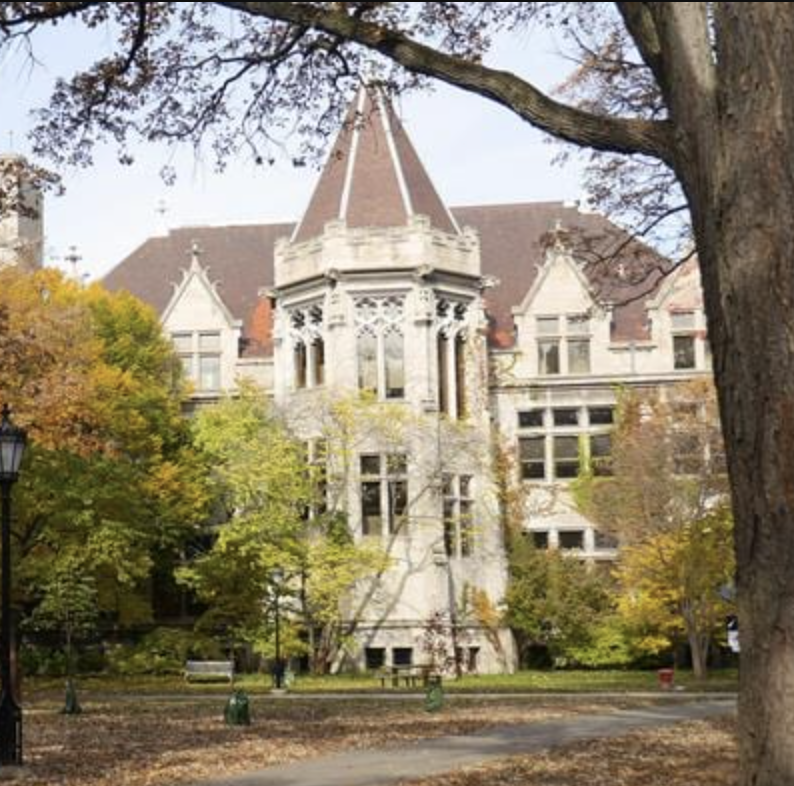As dedicated teachers in the social sciences, you likely have questions about how to prepare and teach your courses this year. We have curated the following resources to support you in making the most of your teaching for 2020-21, with innovative courses and learning experiences that express the spirit of the College and the Division. Each section includes several links as well as the names of "content experts" who are available for further consultation.

Teaching Insights
SSCD instructor testimonials from Spring 2020

Immersive Course Bundles for Fall 2020
Innovative course and Core sequences available to students in Fall quarter
Resources
- Panelists Ada Palmer, Associate Professor in History and the College, and Anne Henly, Senior Lecturer and Director of Undergraduate Studies in Psychology, lead an informal discussion about remote teaching strategies that address student disability, heightened stress, personal or family illness, and other circumstances that teaches may encounter this academic year.
- View the video here
- Panelists Ada Palmer, Associate Professor in History and the College; Daragh Grant, Senior Lecturer and Co-Chair of Classics of Social and Political Thought; and Jennifer Spruill, Senior Lecturer and Co-Chair of Power, Identity, Resistance, discuss strategies for engaging students and making the best use of class time in a remote learning environment.
- View the video here
- Members of the Committee on Course & Core Innovation in the Social Sciences lead a Town Hall discussion on remote teaching in the year of COVID-19, offering new perspectives on remote teaching and learning grounded in consultation with colleagues and experience from spring 2020.
- View the video here
- Academic Technology Specialists (SSCS) can provide remote support with any technical problems you encounter in remote or hybrid teaching (phone consultation also available, 773.702.0793)
- Chicago Center for Teaching offers a range of confidential course consulting services to faculty and instructors (Chicago Center for Teaching website)
- Chicago Studies offers individual consultation to instructors wishing to integrate experiential, place-based, or Chicago-focused content into classes (including remote classes; Chicago Studies website)
- Course Innovation Grants of up to $2500 are now available to support course adaptations for the coming year (College Curricular Innovation Fund)
- Experiential Learning Grants of up to $3000 are available to support Chicago-area excursions, guest speakers, and other forms of city-engaged experiential learning (CollegeSurveys website - Chicago Studies)
- Zoom – video-conferencing software to manage large or small group online presentations and discussions. Zoom is your key tool for face-to-face teaching online. Get training | More resources
- Canvas – course management software for organizing and sharing materials, hosting asynchronous discussions, and grading student assignments. Get training | More resources
- Panopto – software that provides simple tools for producing, presenting and annotating videos. Get training | More resources
- Course Set-up for Teaching Remotely helps instructors make sure they have the necessary hardware and software for online teaching (Teaching Remotely website)
- Online Course Facilitation Checklist offers concise "to-do's" before, during week 1, at the mid-point, and at the end of an online class (PDF - adapted from Colorado State University)
- Ten "Best Practices" for Online Teaching reviews key pedagogical considerations for online teaching (Chicago Studies website, adapted from Stanford University)
- Pedagogical Guidance for Remote Teaching & Learning offers a number of detailed resources & recorded workshops on a range of topics (Chicago Center for Teaching website)
- Remote Teaching Techniques by Preferred Teaching Method offers online "translations" of common face-to-face teaching methods (PDF - Chris Skrable, Chicago Studies & Experiential Learning)
- Fall 2020 Guidelines for Course Instructors includes recommendations for making the most of limited classroom space, shortened class sessions, and remote/hybrid course models (UChicago Google doc - Ad Hoc Course Innovation Group, SSCD)
- Active Learning Techniques for the Virtual and Face-to-Face Classrooms offers 20 suggestions for engaging students during class time, both in-person and online (PDF - Chris Skrable, adapted from California State University)
- High Impact Educational Practices are evidence-based teaching techniques documented to improve critical thinking in classes, no matter their format (PDF - American Association of Colleges & Universities)
- Liberating Structures are discussion frames (microstructures) for engaging participants more deeply in in-person or online conversations and classes (Liberating Structures website)
- COVID-19 Crisis Syllabus Design Guide suggests simple ways to structure teaching so as to support student resilience (PDF - Ada Palmer, History)
- Accessibility Considerations for Online Teaching reviews ways instructors can better accommodate students with disabilities ("Teach Anywhere" website, Stanford University)
- Resources for Teaching Students with Disabilities offers deeper explorations of a range of topics for instructing students with a range of disabilities (Student Disability Services website)
- UChicago Help offers a process for faculty and course instructors to report concerns about students' mental and emotional health and well-being (Campus & Student Life website)
- Center for College Student Success provides resources and tools to First-Generation, Lower-Income, and Immigrant (FLI) students in the College (Center for College Student Success website)
- Fall 2020 Guidelines for Course Instructors includes recommendations for building and maintaining a sense of community in remote and hybrid classes, as well as suggestions for departments or programs seeking to support a more engaging cohort experience for their students (forthcoming Google doc - Ad Hoc Course Innovation Group, SSCD)
- ExoTerra Imagination Lab is a group creative/speculative lab activity designed to be compatible with many different kinds of courses, available as an "add-on" experimental component in which interested instructors may encourage their students to participate (Ada Palmer, History)
- Syllabus Rubric for Online Communities of Inquiry offers a framework for evaluating a class design's potential for building learning communities (PDF - Society for Information Technology & Teacher Education)
- Experiential Learning for Remote, Individualized, Collaborative, and Face-to-Face Classes offers ways to adapt field trips, guest speakers, and other forms of experiential learning to a range of class formats (PDF - Chris Skrable, Chicago Studies & Experiential Learning)
- Chicago Engagement Across the Curriculum lays out general principles as well as models for classes that seek to engage Chicago as a form of enrichment, as a featured example, or as a focus for content and/or ongoing experiential engagement (PDF - Chris Skrable, Chicago Studies & Experiential Learning)
- Community-based Learning Syllabus Rubric offers specific guidelines for incorporating experiential/community-based assignments into a class' syllabus, assignments, and other structures (PDF - Chris Skrable, Chicago Studies & Experiential Learning)
- Safety Considerations for Chicago Exploration during COVID-19, aimed at students, will offer regularly-updated recommendations for navigating the city safely in light of current CDC and City of Chicago recommendations (forthcoming - Chicago Studies website)
- Application for Experiential Learning Microgrants for 2020-2021 Classes allows instructors to apply for up to $3000 in funding for engaging students in the city (CollegeSurveys website - Chicago Studies)
- Healthy Academic Work Habits for students, scholars, and researchers at all levels offers invaluable recommendations for balancing the many demands of academic work with the necessity of self-care, especially during times of chronic stress such as the COVID-19 pandemic (PDF - Ada Palmer, History)
- Be Well and Stay Connected: Resources and Support collects a number of resources for dealing with remote teaching and other pandemic-related challenges (BSD Faculty Affairs website)
- Staff and Faculty Assistance Program includes access to free remote or in-person counseling for faculty, staff, and qualifying family members (Human Resources website)
- Mental Health Resources offers connections to a range of in-person and remote support services for faculty, staff, students, and community members (PDF, UChicago Diversity & Inclusion)
Remote Teaching for Disability, Stress, and Unforeseen Circumstances (Wednesday, September 23, 2020)
Engaging Students Remotely (Friday, September 18, 2020)
Autumn 2020 SSCD Town Hall (Thursday, August 6, 2020)
One-on-one Consultation
Financial Resources for Course Innovation
Know Your Tools:
Make Sure You're Set Up to Teach Remotely:
Review Best Practices for Online Teaching:
Content expert: Joe Bonni, SSCS Teaching & Technology Group
Content Expert: Chris Skrable, Chicago Studies & Experiential Learning
Content expert: Ada Palmer, History
Content expert: Chris Skrable, Chicago Studies & Experiential Learning
Content Expert: Chris Skrable, Chicago Studies & Experiential Learning
Content expert: Ada Palmer, History

Slack Workspace: SSCDTeaching2020
Contribute your best ideas, resources, questions, and suggestions in dialogue with other instructors